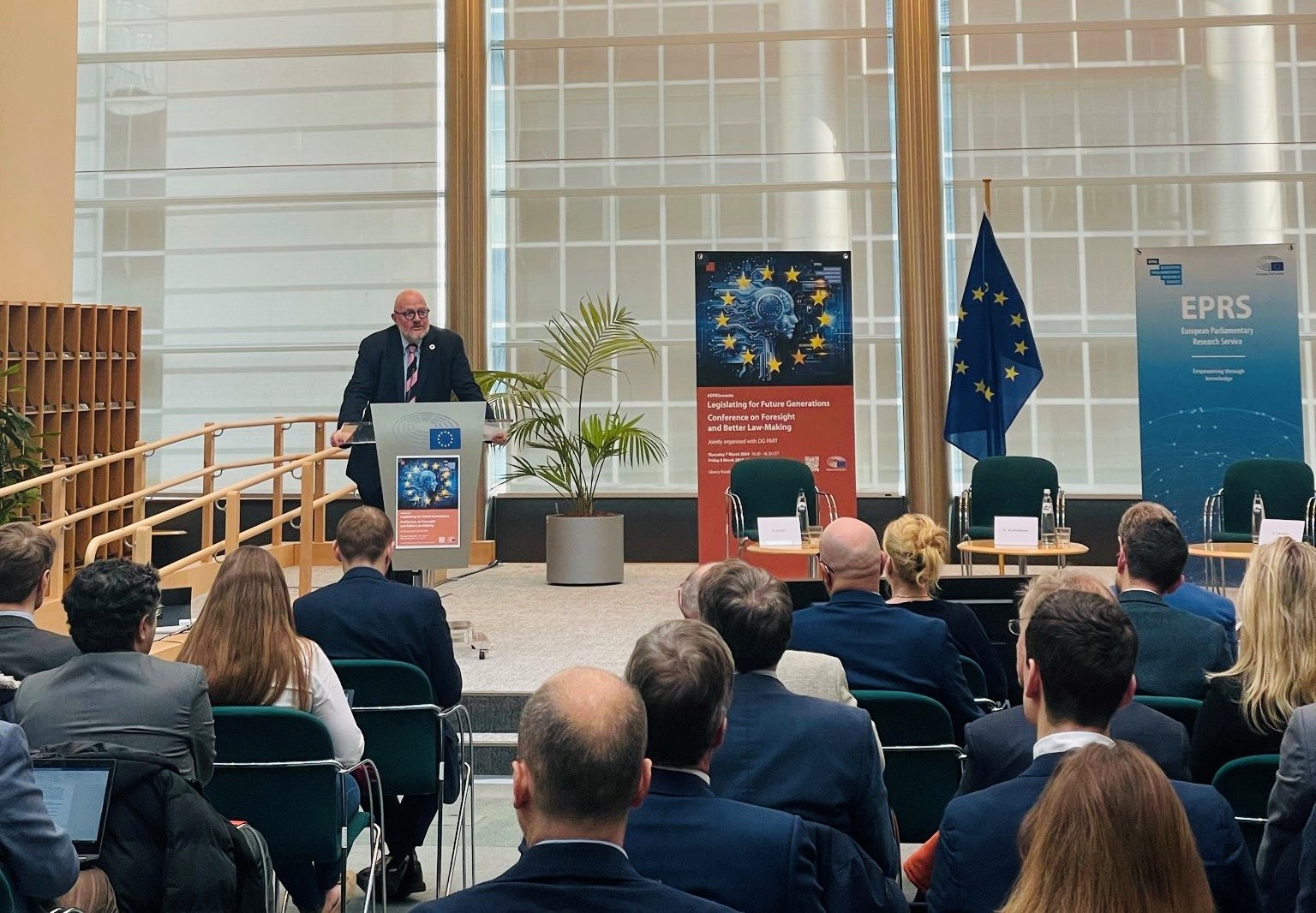
My speech as Vice-President at the Conference on Foresight and Better Law-Making on the topic of ‘Legislating for Future Generations: Trends and Challenges in Impact Assessment and Anticipatory Policy-Making’.
Dear Colleagues from European institutions,
dear representatives of the national parliaments,
dear foresight practitioners,
dear colleagues from the better law-making community,
ladies and gentlemen online
and present in the beautiful Library reading room,
good afternoon!
It is with much pleasure that I open this biannual ‘Conference on Foresight and Better Law-Making’.
The topic of this event – foresight and better law making – organised by the Directorate-General for Parliamentary Democracy Partnerships (DG PART) and the European Parliamentary Research Service (DG EPRS), brings to mind a citation by a Great European, Jacques Delors:“En Europe, il faut le pompier mais aussi l’architecte.”
Your conference is an opportunity to collectively reflect, today and tomorrow, among representatives of the European and national parliaments, among foresight practitioners, among the better law-making community, about past and ongoing crises but, most importantly, about the future.
Our common future, which we as national parliaments and as the European Parliament, are bound to shape together.
Let us grasp this opportunity.
Let us honour Delors’ legacy.
Let us become the architects of the future.
I wish to begin by drawing your attention to our world of today, driven by uncertainty and a multiplication of regional conflicts, including on our own European continent.
Russia’s invasion of Ukraine came as a shock, anticipated by only a few.
It led to a rapid transformation of our EU policies, in particular energy policy and defence policy.
We have also learned a lesson.
For long, we have neglected foresight.
We have been taught the harsh way that we have to stand by our commitment and place foresight again at the heart of our policy-making in order to plan for the best and anticipate the worst.
Let us learn from this lesson and place foresight at the core of our joint national and European efforts to future proof our policies.
For us as a Parliament, as Parliamentarians and as co-legislators future proofing policies and legislation is and must remain a key component of our work.
We need to stand by our Better Law-Making commitments, which stem from the Treaties, reinforced by Inter-institutional Agreements.
Let me highlight here the pivotal role of national parliaments in shaping future proof EU policies, in full respect for the principles of subsidiarity and proportionality.
We wish to engage with you Colleagues and build a ‘community of practices’.
A proposal put forward in the first Better Law-Making Conference in 2022.
Each one of us, parliamentarians, at the national and the European level, are partners in designing the future.
And, I am happy to see that you have or are about to create your own, in-house, foresight capacities.
Let us join forces, exchange practices, learn from past lessons, and contribute our fair share to build a secure future for the next generations of Europeans.
It is only through foresight that we can grasp the trends and the challenges that will shape our world of tomorrow.
It is only through foresight that we will be able to anticipate threats and risks, to strategize and build resilience.
It is only through foresight that we can shape a common vision, future proof our policies, and secure a better future for our fellow European citizens.
What is foresight?
It is not about preferences but about mapping options, including those which we would not like to see materialise but which we must prepare for.
Few anticipated the scale and impacts of the COVID-19 pandemic.
No one questions, with the wisdom of hindsight, our need to prepare on all fronts to possible future cross-border health threats.
From the COVID-19 pandemic, we learned a lesson on the strength of pulling resources, of acting together, when faced with global threats.
Foresight is also about the long term.
The Green Deal, the Commission made its priority, is an example of a policy where evidence and strategic foresight played their full role.
In foresight, we do not think in electoral cycles.
In foresight, we think in decades.
Yet, election results resonate locally and globally, shaping politics for the years and decades to come.
Year 2024 comes with major ballots around the world, including on our own continent.
The results of these elections will shape the composition of governments and parliaments in several EU Member States.
In the global perspective, over 4 bn people, half of the world’s population, are expected to cast a vote.
This is historic.
We are three months ahead of the European Elections on 6-9 June. Hundreds of millions of voters, many of them young, as in Greece 17 is the voting age, and in Austria, Belgium, Germany and Malta it is 16.
They will go to the ballot box to cast their individual vote to elect their representatives in the European Parliament – the only EU institution directly elected by citizens.
It is for them and the next generations that we need to futureproof our policies.
And, let me stress that futureproofing policies entails making them more resilient, fair and equal for our citizens.
Therefore, it is time now, at the eve of the elections, ahead of the next institutional cycle 2024-2029, to pause and reflect.
On the strategic choices ahead of us.
On our ability to act alone or with partners.
On the policy-making instruments, we may need.
As a Member of the European Parliament and as a Vice-President of this House, let me underline that we as a Parliament have supported the goal to make a better use of strategic foresight.
We have called for its integration, when it adds value, into ex-ante impact assessments, ex-post evaluations and REFIT exercises.
As co-legislator, we co-decide with the Council of national ministers on the legislative proposals submitted by the Commission.
We debate.
We amend and find a common ground.
And then, we adopt the final text.
Let me stress that much work takes place in the preparatory stages, before a proposal comes to Parliament.
This time is key.
It allows the Commission to identify how the proposed initiative could shape the future.
And, it is key to be transparent and to keep the Parliament informed during these early stages.
A further strengthening of the existing inter-institutional cooperation is much needed.
What are the benefits of using foresight in better law-making?
It allows identifying early on policy gaps and needs.
It allows acting upon them.
It allows futureproofing our policies for our citizens.
And, let me stress that by using foresight methodology our collective commitment to evidence based policy-making is only better served.
I’ve set the scene, let me now move to the conference itself.
It is my strong belief that this conference is ideally placed to shape the debate on foresight and better law-making by linking the levels.
I hence wish to extend again a warm welcome to the representatives of the national parliaments as well as to those of various international organisations working on foresight.
In the context of this conference, we have the possibility to reflect on how to enhance dialogue with national parliaments and other partners so that we shape our future together.
I am happy to see this conference bringing together a unique community of practitioners and academics to exchange views and share best practices.
Let me encourage you to continue to exchange views beyond the framework of this biannual conference, in a more continuous way.
Through inter-parliamentary cooperation and through this network, we could find new ways to cooperate on foresight and better law-making.
Let us use this conference to reflect on the way to bring to life the ‘community of practices’ I mentioned earlier.
It is only by joining forces and sharing good practices and evidence that we as Parliaments, and as a Union, can futureproof policies.
That we can lead by example.
That we can consolidate globally our widely recognised normative power position.
We can be proud of our core values: freedom, democracy, rule of law and respect of human rights.
They inform our policies.
But cannot be taken for granted, and must be constantly defended.
The same goes for democracy and the citizen’s trust, which we, as parliamentarians, must constantly earn.
Our policies must respond to our citizen’s concerns.
They must deliver on issues, which matter to them.
Foresight, with its anticipatory function, is key.
It allows to future proof policies.
It allows responding to the concerns of the citizens.
It helps meeting their expectations.
Today and tomorrow, you will focus on foresight.
You will take stock of existing practices.
But most importantly, you will look at what could be improved in the next institutional cycle.
You will be the architects.
I close by welcoming you all, once again, to this conference on Better Law-Making entitled ‘Legislating for future generations’ and by wishing you a fruitful conference and good discussions!






